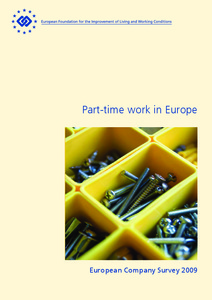Part time work in Europe

European Foundation for the Improvement of Living and Working Conditions, Dublin
Publications Office of the European Union - Luxembourg
2011
VIII, 48 p.
employment policy ; labour market ; part time employment ; working conditions
Working conditions
http://www.eurofound.europa.eu/sites/default/files/ef_files/pubdocs/2010/86/en/3/EF1086EN.pdf
English
Bibliogr.;Annex
"Non-standard employment and, more particularly, part-time work has been increasing worldwide for
the past two decades. This trend has been especially strong in Europe, where the issue of different
working time arrangements is an important part of the discussion among policymakers and social
partners, and something which the European Union (EU) has promoted to increase flexibility for
workers and employers.
Indeed, in an EU Framework Agreement the social partners have expressed their willingness to eliminate
discrimination against part-time workers.
This kind of work, in the widest sense, may have both positive and negative effects for governments,
workers and employers. An important aspect is that it can allow employees to stay in the labour
market by being able to adapt their work to their home life. It is increasingly being looked at from a
life-course perspective: why it might be useful to people in some phases of their life, and whether they
are able to move from part-time to full-time and back again. These sorts of transitions are essential for
a modern labour market. The focus of many studies has been the effect of part-time work on individual
careers, especially those of highly qualified people. It is often argued that there are no jobs available
for highly qualified people who wish to work part-time. However, the question remains whether this
is true and where in Europe such jobs exist. This report looks at the results of two surveys, conducted
by Eurofound, that contribute to research on part-time work. The second European Company Survey
(ECS, carried out in 2009) concentrates on the company perspective of part-time work. This survey
included questions, not only on the existence of part-time work at establishment level, but also on
the number of highly qualified people or managers working part-time. At the same time, the fourth
European Working Conditions Survey (EWCS, carried out in 2005) provides insight into part-time work
from the employees' perspective, especially the working conditions of part-time workers. This report
looks at the results of these two surveys and focuses on the effect of part-time work on the career of
individuals and on those who are highly qualified or in management positions."
Digital
The ETUI is co-funded by the European Union. Views and opinions expressed are however those of the author(s) only and do not necessarily reflect those of the European Union or the ETUI.